"We have argued from the start that this is bad legislation and the Obama administration has made clear that it agrees," APN President and CEO Debra DeLee said in a statement on the measure.
By HILARY LEILA KRIEGER
"We have argued from the start that this is bad legislation and the Obama administration has made clear that it agrees," APN President and CEO Debra DeLee said in a statement on the measure.
By HILARY LEILA KRIEGER
By MATTHEW WAGNER
At Pollard's request, Rabbi Ya'acov Shapira will work to strengthen Jewish hold on disputed east J'lem house.
At the request of Jonathan Pollard, Rabbi Ya'acov Shapira, head of the Merkaz Harav Yeshiva, will launch various educational and spiritual activities designed to strengthen the Jewish hold on a disputed house in east Jerusalem.
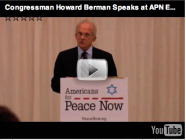
By Haaretz Editorial
There is no way to describe the West Bank settlers' attack on the Palestinian village of Bitilu but as a well-planned terror attack. The settlers' "military" organization and violent resistance to the cabinet decision to destroy the illegal outpost of Givat Menachem, as described by Chaim Levinson in Haaretz yesterday, are no different from the activities of other terrorist organizations. This includes the incitement, ranting and raving preceding the act of vengeance on Bitilu, the attempt to set a house on fire, the injuring of villagers with stones, and the threat to continue these violent tactics.
Speaking at an Americans for Peace Now luncheon in honor of APN activist and Jewish community leader Irwin Levin, Berman (D-CA) said: "Over the years, I discovered two things: first, I learned that there were indeed many Palestinians who were prepared to accept Israel and who genuinely believe in coexistence. Second, I discovered the immense toll the occupation is taking on Israel."
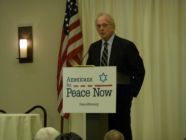
Berman to APN: Israel in Danger of Ceasing to be a Jewish Democracy; Praises APN's Commitment to Peace
Los Angeles, CA - House Foreign Affairs Committee Chairman, Rep. Howard Berman today told a group of Americans for Peace Now activists and supporters in Los Angeles that if Israel maintains its rule over the West Bank and Gaza, it will either cease to be a democracy, or will cease to be Jewish.
By Donald Macintyre in Jerusalem
Demonstrations against evictions of Palestinians to make way for Jewish settlers
At least 15 protesters were arrested yesterday as several hundred left-wing Israelis held their biggest demonstration yet against demolitions and evictions of east Jerusalem Palestinians designed to make way for Jewish settlers.
By Nir Hasson
Hundreds of left-wing activists, including several prominent politicians, protested in the Sheikh Jarrah neighborhood in East Jerusalem on Friday.
The protest has become a weekly event in the Sheikh Jarrah neighborhood, held to protest a Jewish takeover of Palestinian homes in East Jerusalem through the use of ownership documents dating from the period of the British mandate in Palestine.
Yedioth Ahronoth (p. B8) by Uri Misgav -- On the hilltop stands a building, like a colonial palace in the Third World. Around it lie the barren pastures of the surrounding villages, a flock of sheep chewing the grass, and two Palestinian shepherds suspiciously eyeing the construction.
"APN is probably right that U.S. pressure on both sides is the only strategy with any real hope of pushing the two sides back to the negotiating table."But he also argues that:
"Leaving aside the question of whether that's smart policy or not, politics suggests the administration is likely to move in the opposite direction."Let's hope David Axelrod isn't drawing this same mistaken conclusion. As we argued in the same paper that Besser is critiquing, Obama has little to lose -- and everything to gain -- by stepping up pressure to make progress toward peace.
FOR IMMEDIATE RELEASE
CONTACT: Ori Nir - (202) 408-9898; onir@peacenow.org
Washington, D.C - Americans for Peace Now today called on President Barack Obama to learn the lessons of last years' unmet expectations on Middle East peace and focus this year on assertive action toward peace for Israel and its neighbors.
I'll be honest with you. A: This is just really hard. Even for a guy like George Mitchell who helped bring about the peace in Northern Ireland. This is as intractable a problem as you get. B: Both sides--I think the Israelis and Palestinians--have found that the political environment, the nature of their coalitions, or the divisions within their societies were such that it was very hard for them to start engaging in a meaningful conversation. And I think that we overestimated our ability to persuade them to do so when their politics ran contrary to that.
From Abbas' perspective, he's got Hamas looking over his shoulder and I think an environment generally within the Arab world that feels impatient with any process.
And on the Israeli front, although the Israelis I think after a lot of time showed a willingness to make some modifications in their policies, still found it very hard to move with any bold gestures. And so what we're going to have to do--I think it is absolutely true that what we did this year didn't produce the kind of breakthrough that we wanted and if we had anticipated some of these political problems on both sides earlier, we might not have raised expectations as high.
Moving forward, though, we are going to continue to work with both parties to recognize what I think is ultimately their deep-seated interest in a two-state solution in which Israel is secure and Palestinians have sovereignty and can start focusing on developing their economy and improving the lives of their children and grandchildren.
(emphasis added)
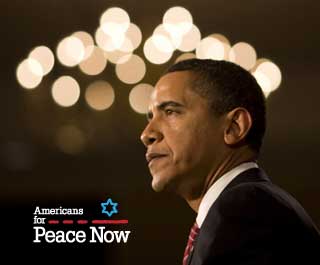
In advance of the State of the Union address, APN asked President Barack Obama to recommit to pushing peace for Israel.
This followed blessings of hope prepared by Rabbi Neil Comess-Daniels on the anniversary of Obama's inauguration.
APN also recently called on President Obama to be prepared to play hardball with Israel, the Palestinians, and the Arab world.
Seven Blessings Celebrating the First Year in Office of President Barack Obama.
By Rabbi Neil Comess-Daniels
1) We are in awe and in wonder before and within the Unity of All and we express our appreciation for being Jews embraced by the bountiful freedoms that are "America."
2) We are in awe and in wonder before and within the Unity of All, realizing that our presence in this nation is a gift, as it is for all our fellow citizens.
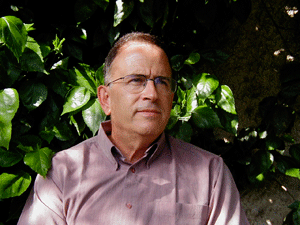
Q. A year after Israel's Operation Cast Lead in Gaza, how would you assess the ramifications and consequences?
A. Given the limited military, geographic and political nature of last January's Gaza war, the ramifications are surprisingly far-reaching. They cover the extent of deterrence achieved, consequences for future strategies of war-fighting by Israel and others, and of course the international reaction in the realms of war-prevention and diplomacy as well as human rights. And they are a decidedly mixed bag.
By Leonard Fein.
Trying to make sense of Israel's assault on Gaza, which ended exactly a year ago this week, is a daunting challenge. There is no agreement on how many Gazans were killed nor on how many were combatants, how many innocent bystanders. The Israeli authorities claim that 49 women and 89 children were among the killed, but the Israeli human rights organization B'Tselem says the accurate numbers are 107 women and 320 children.
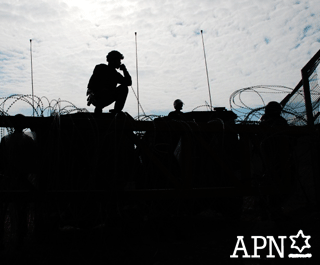
A year after the end of the Gaza War, Americans for Peace Now is reflecting on what Operation Cast Lead left behind.
We, Americans who believe that only through peace could Israel achieve true security, are grieving the victims of this war and of the hostilities that preceded it, on both sides of the Israel-Gaza border.
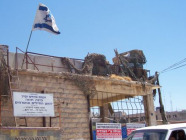 Yesterday, Israel's High Court of Justice held a hearing on a Peace Now
petition calling for the removal of settlers who live in a military
base in Hebron.
Yesterday, Israel's High Court of Justice held a hearing on a Peace Now
petition calling for the removal of settlers who live in a military
base in Hebron. Alpher answers questions on Egypt's decision to build an underground wall at the Rafah border, Israel's next steps in the Gilad Shalit negotiations, and Labor MK Ophir Pines-Paz's resignation from politics.
Alpher answers questions on Egypt's decision to build an underground wall at the Rafah border, Israel's next steps in the Gilad Shalit negotiations, and Labor MK Ophir Pines-Paz's resignation from politics.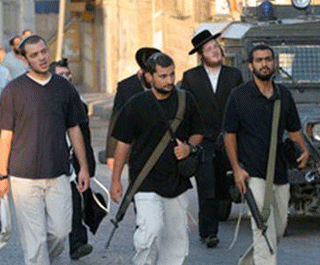 A frightened kidnapped Israeli soldier is sending a taped video message to the Israeli public. He tells who he is, assures his loved ones that his captors are treating him well. They are feeding me, he says, and adds "kosher food," as the barrel of a gun nudges his shoulder. As the camera zooms out, the viewers realize that the captors are not Hamas terrorists but rather two armed settlers.
A frightened kidnapped Israeli soldier is sending a taped video message to the Israeli public. He tells who he is, assures his loved ones that his captors are treating him well. They are feeding me, he says, and adds "kosher food," as the barrel of a gun nudges his shoulder. As the camera zooms out, the viewers realize that the captors are not Hamas terrorists but rather two armed settlers. E.B. SOLOMONT, Jpost correspondent in New York , THE JERUSALEM POST
NEW YORK - Inside a glittering New York City ballroom on Wednesday night, several hundred people turned out to support the construction of Jewish housing near an Arab-populated part of east Jerusalem.
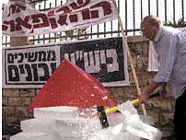 Israeli extremists opposed to the settlement freeze have made threats deemed credible by the authorities on the life of Israeli Defense Minister Ehud Barak. Also, the arrested Jewish terrorist Yaacov Teitel reportedly told Israeli investigators that he wanted to kill Peace Now Director General Yariv Oppenheimer.
Israeli extremists opposed to the settlement freeze have made threats deemed credible by the authorities on the life of Israeli Defense Minister Ehud Barak. Also, the arrested Jewish terrorist Yaacov Teitel reportedly told Israeli investigators that he wanted to kill Peace Now Director General Yariv Oppenheimer.Increasingly, you hear them at public events and symposia. You read their analyses in the press and on blogs. They are the "no-solutionists."
Ultra-skeptical, hypercynical, often giddy about their political nihilism, they typically argue something along these lines: "As a realist, I realize that there are problems in this world that simply can't be resolved. The Israeli-Palestinian conflict is one of them."
They say: You keep talking about a "solution" to the Israeli-Palestinian conflict. But there are problems that simply can't be "solved." The Israeli-Palestinian conflict is one of them.
THEY SAY: A prominent American Jewish human rights organization, the Simon Wiesenthal Center, has received a green light from Israel's Supreme Court to build the Museum of Tolerance in West Jerusalem. Why is Americans for Peace Now siding with the Arabs against the project?
By Josh Nathan-Kazis
An early January announcement that Israeli authorities had approved a new Jewish settlement on the campus of an American-funded yeshiva in East Jerusalem came just weeks after President Obama issued a statement condemning new Israeli construction in the area.
When I returned to Israel in the summer of 2000, following a four-year stay in the West Coast, I had two job offers. Ha'aretz offered me the Israeli-Arab beat, covering Jewish-Arab relations in Israel. And Yediot Ahronot offered me a unique beat, which would be created especially for me: the positive beat. All the time we only report bad stuff, the editor explained to me. We need good news and we need someone to proactively pursue good news, to make it his beat, the editor said.
THEY SAY: Why is Americans for Peace Now pressing for another ceasefire, when the last ceasefire was used by Hamas, predictably, to shore up its forces and prepare for even steeper violence against Israel. Israel is fighting a war against an organization dedicated to wiping it off the map. Given this reality, APN should be supporting Israeli efforts to defeat Hamas, not putting pressure on Israel to establish self-defeating, short-lived ceasefires with it.
They say: Israel is today again at war in Gaza. Doesn't the continued violence from Gaza prove, clearly, that Americans for Peace Now and others are wrong in arguing that giving land to the Palestinians will deliver any sort of peace for Israel?
THEY SAY: Israel is a tiny country - smaller than many U.S. states - with little strategic depth. Asking Israel to give up land to the Arabs is the same as asking Israel to sacrifice its security.

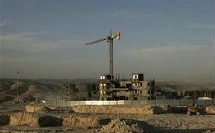 By Akiva Eldar
By Akiva Eldar